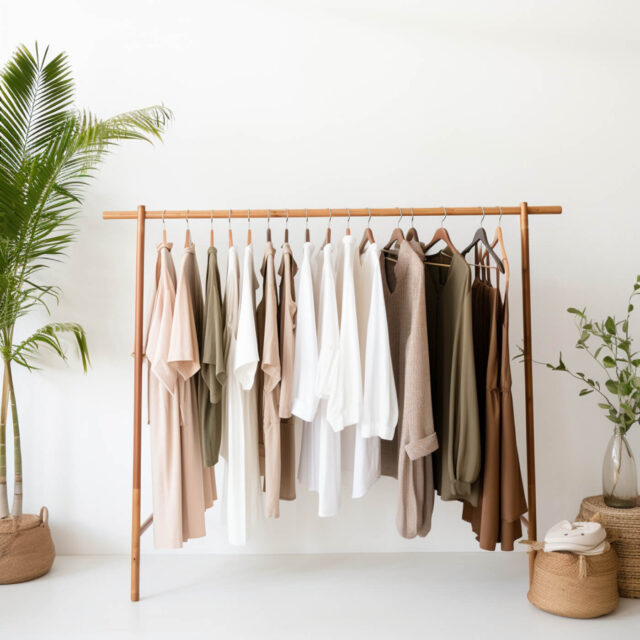In an age when environmental concerns and moral principles have become paramount, a new generation of luxury fashion designers is ready to change the course of the fashion industry. They expand the notion of ‘luxury’ to include more than just salt and design; they are at the forefront of ethical consumerism and raise the standards. Designastuff.com explores how and why this change is necessary for the world and consumers as luxury designer brands, cars, hotels, and real estate go green.
The Upward Trend of Sustainability in Designer Wear
Designer brands are rolling the dice on sustainability by presenting it as a core behind their luxury. Once deemed excessive by the critics; now, a good number of these brands epitomize sustainability as a way of doing business. They are altering the buying behavior of their consumers through brand trust, new materials, and green networks.
Louis Vuitton’s eco-design workshops and Gucci’s ‘Equilibrium’ campaign are just some of the numerous examples of luxury fashion houses that are striving to implement best sustainable practices- this means lower carbon emissions! Many luxury houses seems to have disregarded the stereotype that ethics and luxury don’t go together as they focus on sustainable materials and ethical production.
Not All Brands Are Created Equal: Who Is Making a Difference?: The trend towards sustainable fashion is led by a few luxury brands. First, let’s mention the most successful ones:
Top Sustainable Luxury Brands
| Brand | Sustainability Initiative | Impact |
|---|---|---|
| Stella McCartney | Use of organic cotton and vegan leather | Pioneering cruelty-free fashion |
| Gucci | “Gucci Off the Grid” collection made from recycled materials | Promotes circular fashion economy |
| Prada | Re-Nylon project using regenerated nylon | Reduced dependency on virgin plastics |
| Patagonia | Lifetime repairs and resale options | Extends product lifecycle |
Sustainability in Luxury Cars: A Paradigm Shift
The automotive sector, synonymous with opulence and power, is also embracing sustainability. Brands like Tesla, BMW, and Mercedes-Benz are revolutionizing luxury cars by introducing electric and hybrid models that blend cutting-edge technology with eco-friendly innovation.
Key Features of Sustainable Luxury Cars
- Electric Propulsion: Reduces reliance on fossil fuels.
- Recyclable Materials: Interiors made from bamboo and recycled plastics.
- Energy Efficiency: Advanced engineering minimizes energy consumption.
Luxury car buyers are no longer just seeking status symbols but vehicles that align with their environmental values.
Luxury Travel: Ethical Journeys Redefined: Travel, a cornerstone of the luxury lifestyle, is undergoing a sustainability makeover. Discerning travelers now demand experiences that prioritize environmental conservation and cultural respect.
- Eco-Resorts: Properties built using renewable resources and offering carbon-neutral stays.
- Private Jets with Offsets: Airlines like NetJets offer carbon offset programs for luxury travelers.
- Cultural Preservation: Tours that invest in local economies and traditions.
Luxury travel brands are creating journeys that are not only exclusive but also environmentally and socially conscious.
Premium Real Estate: The New Face of Sustainable Living: Sustainability in real estate is not limited to affordable housing. Premium real estate markets are embracing green architecture and smart home technology, transforming how the wealthy live.
Key Aspects of Sustainable Premium Real Estate
| Feature | Benefit |
|---|---|
| LEED-Certified Buildings | Reduced energy consumption and improved air quality |
| Smart Home Technologies | Minimizes water and electricity wastage |
| Renewable Energy Sources | Solar panels and wind turbines reduce environmental impact |
Eco-conscious buyers now prioritize homes that reflect their values, from energy-efficient designs to ethical construction practices.
Why Sustainability in Luxury Matters
Ethical Consumerism on the Rise: Modern consumers demand transparency and responsibility from brands. By adopting sustainable practices, luxury brands cater to a clientele that values ethics as much as exclusivity.
The Long-Term Payoff: Sustainability is not just a trend but a necessity. Brands investing in eco-friendly innovations future-proof their businesses and contribute to a healthier planet.
Top 10: Sustainable Fashion Brands
Ranking the Best in Ethical Fashion:
| Rank | Brand | Key Initiative |
|---|---|---|
| 1 | Stella McCartney | Vegan and cruelty-free materials |
| 2 | Patagonia | Circular economy and lifetime warranties |
| 3 | Gucci | Reduced chemical dyes in manufacturing |
| 4 | Prada | Sustainable nylon collections |
| 5 | Eileen Fisher | Organic fabrics and fair-trade practices |
| 6 | Vivienne Westwood | Activism-driven sustainable collections |
| 7 | Balenciaga | Carbon-neutral logistics and packaging |
| 8 | Burberry | Recycling unsold stock and avoiding waste |
| 9 | Chloé | Focused on small-scale, sustainable suppliers |
| 10 | Hermès | Investments in eco-leather production methods |
FAQs About Sustainability in Designer Brands
Q1: What are luxury brands’ sustainability campaigns?
Luxury brands are launching initiatives to promote eco-friendly materials, ethical labor, and renewable energy use. Examples include Gucci’s “Equilibrium” and Louis Vuitton’s renewable packaging.
Q2: Which luxury brands are sustainable?
Top sustainable luxury brands include Stella McCartney, Gucci, and Patagonia, known for their eco-friendly innovations and ethical practices.
Q3: What is sustainability in luxury fashion?
It involves reducing environmental impact through renewable materials, transparent supply chains, and ethical labor. Luxury fashion now prioritizes longevity over fast consumption.
Q4: What are the top 10 sustainable fashion brands?
Stella McCartney, Patagonia, and Gucci top the list, followed by other brands focusing on circular economies and ethical production.
Conclusion: Leading the Way to a Greener Future
Sustainability is no longer optional in the world of luxury. From fashion to cars, travel, and real estate, the shift towards ethical and eco-conscious practices is transforming industries. Designer brands embracing this change not only set an example but also pave the way for a more responsible and sustainable future. By choosing sustainable luxury, consumers can enjoy the best of both worlds—exquisite quality and a commitment to the planet. Luxury, after all, is about leading the way, and these brands are proving that sustainability is the ultimate hallmark of sophistication.







